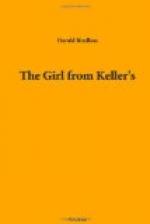The rain and cold revived him, but walking was difficult, and when he reached the shack he fell into a chair. Festing was not in, and Charnock remembered he had said something about having extra work to do. It was dark, but the log fire threw out a red light, and by and by Charnock, glancing round as the shadows receded, thought there was something unusual on the table. It looked like a bottle, but they kept no liquor in the shack. Festing was abstemious but Charnock suspected that he had practised some self-denial for his sake.
He waited until a blaze sprung up, and then his relaxed pose stiffened. It was a bottle of whisky, better stuff than the railroaders generally drank, for he knew the label. Moreover, when the light touched the glass the yellow reflection showed that it was full. He got up and approached the table, wondering how the liquor came there, until he saw some writing on the label. Picking up the bottle, he read his own name.
He put it down abruptly and stood with his hand clenched. The veins swelled on his forehead and the pain nearly left him as he fought with temptation. It was some weeks since he had tasted liquor, but this was not all. A drink would give him relief from the gnawing ache and perhaps a night’s sound sleep. If he could get that, he might be well for most of the next day. But he shrank from the remedy. There was liquor enough to last some days, but the next bottle would not last as long, and he knew there would be another. He must resist and conquer his craving now.
He opened the door and picked up the bottle by the neck. With a swing of his arm he could throw it among the pines; he wanted to hear it smash. Victory could be won by a quick movement; but afterwards? The touch of the glass and the way the yellow liquid gleamed in the light fired his blood. If he was to win an enduring victory, he must fight to a finish.
Leaving the bottle in the light, he moved his chair and sat down close by, after which he looked at his watch. He would give himself half an hour. If he could hold out now, he need not be afraid again, because the odds against him would never be so heavy. The craving was reenforced by pain and bodily fatigue; his jangled nerves demanded a stimulant. Yet to win would make the next conflict easier, and he had resources that he tried to marshal against the enemy.
The rough work on the track had given him confidence. He had always had physical courage and muscular strength, and it was something to feel he could hold his own with his comrades at a strenuous task. Moreover, his saving Festing from the river had restored his self-respect. But he had stronger allies, and his face got hot as he thought of the two women who had fought for him when he had scarcely tried to help himself.




